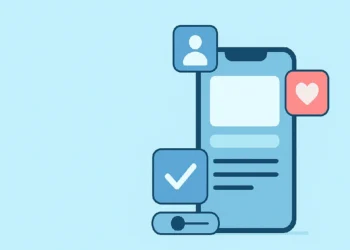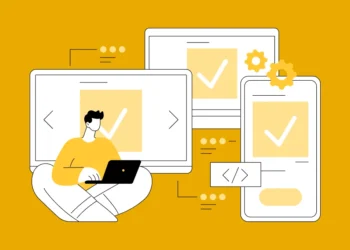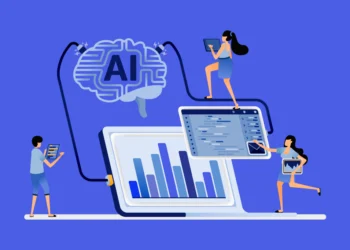The first question that comes to every developer, startup, and business mind while building a mobile app is Should we develop for iOS or Android? Both platforms are performing equally well in the global market, boasting a loyal user base, unique advantages, and technical differences.
Deciding the right one will determine your app’s reach, development cost, design approach, and even how quickly you launch. To determine the best fit for your business, you need to understand the features and key differences of each option. Let’s compare their pros and cons to help you decide which platform best suits your needs and objectives.
What is iOS App Development?
iOS app development is the process of building mobile applications for all Apple devices, such as iPhone and iPad. To create iOS apps, developers use Swift, which is Apple’s modern programming language, or sometimes Objective-C, which is older but still used in some projects.
Apple has an official development tool called Xcode; all iOS apps are built and tested using this tool only. Apple is known for its strict App Store guidelines, which means developers need to meet high standards for design, security, and functionality. While this can make the approval process a bit tougher, it also builds trust among users because they know iOS apps are safe and reliable.
In short, iOS app development is all about creating secure, high-quality, and user-friendly apps for Apple’s loyal customer base.
What is Android App Development?
In Android app development, developers create a mobile application that can work on Google’s Android system. It powers many smartphones, tablets, and even smart TVs around the world, making it the most widely used mobile platform globally.
Developers usually write Android apps using Java or Kotlin. Kotlin is now the preferred language because it’s more modern and easier to work with. To build and test apps, developers use Android Studio, which is Google’s official integrated development environment (IDE).
The one significant advantage is that Android development offers flexibility and freedom, which you’ll lack in iOS. Android is an open-source platform, which means developers have more options to customise their apps and reach different types of devices.
Key Differences Between iOS and Android App Development
| Aspect | iOS App Development | Android App Development |
| Programming Languages | Swift, Objective-C | Kotlin, Java |
| Development Tools | Xcode (Apple’s IDE) | Android Studio (Google’s IDE) |
| Design Guidelines | Human Interface Guidelines | Material Design |
| App Store Approval | Strict, detailed review | Faster, more flexible |
| Device Fragmentation | Limited devices, easier testing | Many devices, more testing needed |
| Development Cost & Time | Faster to develop, lower testing cost | It may take longer due to extra testing |
Pros and Cons of iOS and Android App Development
When choosing between iOS and Android, you need to consider all the pros and cons.
Pros of iOS App Development
- Good User Experience: iOS devices have the type of hardware and software that helps provide smoother performance and polished interfaces.
- Better Revenue: iOS users spend a significant amount of money on apps and in-app purchases, which will help you build substantial revenue.
- Strong Security: iOS apps are more secure than Android because Apple has strict guidelines and a closed ecosystem.
- Easier Testing: With fewer devices and screen sizes, testing is faster and compatibility issues are reduced.
Cons of iOS App Development
- Strict App Store Rules: Getting approval can be challenging and time-consuming.
- Limited Customisation: Developers have less freedom to experiment with design and features compared to Android.
- Apple-Only Audience: iOS apps only reach users with Apple devices.
Pros of Android App Development
- Broader Reach: Android holds the most significant global market share, especially in emerging markets.
- More Customisation: Developers have more freedom to customise app design and features.
- Faster Approval: Google Play Store has a quicker and more flexible review process.
- Multiple Distribution Options: Apps can be distributed through third-party stores or directly.
Cons of Android App Development
- Device Fragmentation: The variety of devices and screen sizes requires more testing and may introduce additional bugs.
- Lower Revenue per User: Android users generally spend less on apps and in-app purchases.
- Security Risks: An Open ecosystem can lead to higher risks of app piracy and security issues.
Which Platform Should You Choose?
What should you choose, iOS or Android? Honestly, it depends on your business goals, budget, timeline, and target audience. Since neither is bad, it ultimately depends on what you want from your app.
If you’re looking for higher revenue per user, enhanced security and privacy, and a premium audience, iOS is designed specifically for you. The caveat is that if you want a smoother development process with fewer devices to test, go for iOS.
If you’re looking for high reach, consider regions where almost 75% of the public uses Android exclusively, such as Asia and Africa, and opt for Android. It gives you more freedom to customise your app according to your vibe.
Now, the twist is that startups nowadays are becoming increasingly sophisticated, and many times they decide to build an app for both platforms. It will surely help you become future-ready, because you never know when iOS might take over.
In the end, consider your users’ needs, the desired look and feel of your app, and what aligns with your budget and timeline. Once you’re clear on that, you’ll be able to make a confident choice.
Conclusion
Choosing between iOS and Android app development is one of the most critical decisions when bringing your app idea to life. Both platforms have unique strengths and challenges; what matters is knowing your audience, setting clear goals, and choosing the right approach for your budget and timeline.
If you’re still unsure which path is right for your business, working with an experienced mobile app development company in Bangalore can make the process much easier. The right app development company in Bangalore will help you plan, design, build, and launch a high-quality app that reaches your target users and stands out in a competitive market.
In the end, whether you choose iOS, Android, or both, what counts is building an app that delivers real value and keeps your users coming back for more.

















